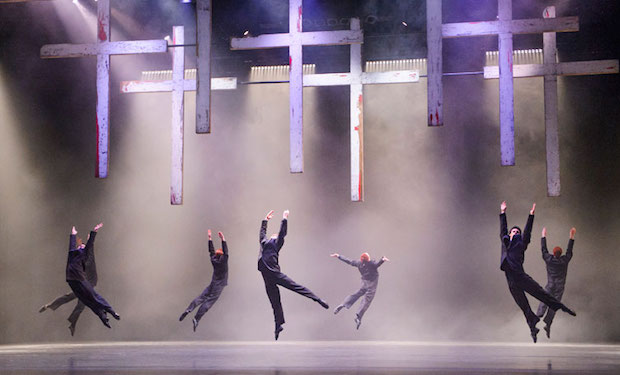We ballet-goers may be the most self-deceiving audiences in theatre. Put a ‘new work’ in front of us and half of us go into conniptions because the classical palace is being brought down and the other half into raptures at not having to sit through some old-hat ballet-ballet.
Twenty years ago, David Bintley was appointed artistic director at Birmingham Royal Ballet. For his debut creation there, having defined himself at Covent Garden as a well house-trained classical choreographer, he picked on Carl Orff’s bold, brash choral work about naughty medieval priests, Carmina Burana.
The London critics’ reception was broadly (if I remember rightly — I was one of them) sniffy. I think I thought that the unfrocking monks were vulgar without being ballsy or funny, as the libretto’s jolly blasphemies and Orff ’s knowing grossness required. But what a difference 20 years of TV and newspapers make. The centrepiece of BRB’s celebration of 20 Bintley years looks like a prophetic compilation of cultural references.
The OTT atmosphere of Philip Prowse’s styling (bleeding crucifixes, smoke, a sinister masked lady in red) is pure Dan Brown. The young priests mustering at the beginning, startled by seeing actual girls, recall Craggy Island’s goggle-eyed fathers lost in Ireland’s largest lingerie department; the pig-headed City gluttons salivating over a plumed young danseuse as Orff’s strangled-tenor aria salutes the roast swan have been in our thoughts ever since Cedric the Pig.
So 20 years of happenings have given Bintley’s production unwitting satirical edge. But it doesn’t change the fact that — for all his strenuous vaudeville efforts there — the better part of him is his talent for the kind of lyrical classical work that is presently out of fashion (maybe we’ll see it in his creation this summer?).
Fashion is certainly the reason for Royal Ballet artistic director Kevin O’Hare’s commissioning of a total outsider, Hofesh Shechter, for a coveted slot on the most provocative mixed bill of the year, which you can catch at Covent Garden just now. Shechter’s Israeli nationality is a fertile source for his pounding militaristic group works in which the vehemence of the emotion piledriving through the ensemble has sometimes achieved terrific theatrical resonance (viz his signature piece, Political Mother, with shatteringly loud live rock and a boiling of soldiers and civilians).

His debut ballet creation, Untouchable, reworks that trope with camouflage-clad troops, male and female, thumping and clumping in more politely apocalyptic conditions (once again scored by himself with Nell Catchpole and lit by Lee Curran).
I take this as a bit of a cop-out by both Shechter and O’Hare. This should have been a prime opportunity for a rising contemporary choreographer to use ballet dancers to bring out something new in his creativity, and O’Hare should have insisted on him not repeating himself.
Untouchable has a chant of ‘Nigel Farage’ buried in its score, and supposedly addresses the loneliness of the migrant, but it feels like a diluted sampling of Political Mother. Still, if you haven’t seen Shechter’s stuff before, the vigorous commitment of the Royal Ballet’s dancers in its heavy-legged, heavy-shouldered metachronal rhythms will thrill you, before you scratch your head over what on earth it has to do with ballet.
The outcome of courage is shown by the other works on the bill. Balanchine’s The Four Temperaments (1946) and MacMillan’s Song of the Earth (1965) both push forward into new ground, impatient of familiarity. In the first, a staggering ballet to a great Hindemith score that wittily portrays Melancholic and Phlegmatic males and Sanguinic and Choleric females, Balanchine reworks the familiar, gorgeous classical language with an innovative descriptive freedom and subversive sexual role reversal that eloquently suits star individuals like Steven McRae, Vadim Muntagirov, Edward Watson and Zenaida Yanowsky.
MacMillan was equally defiant for Song of the Earth, even quitting the Royal Ballet to make it, due to resistance at HQ to anyone painting over Mahler’s musical masterpiece. The genius that the choreographer unleashes in ‘Abschied’ wipes away some longueurs earlier on. As the woman facing death, Laura Morera’s emotion in the second cast carries all humanity with her, but it’s Carlos Acosta as Death in the first cast who has the worrying casualness that cuts to the quick just now.






Comments